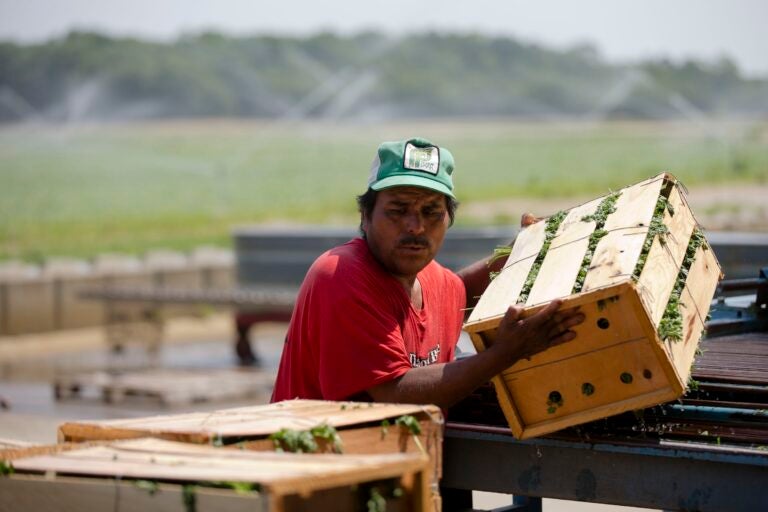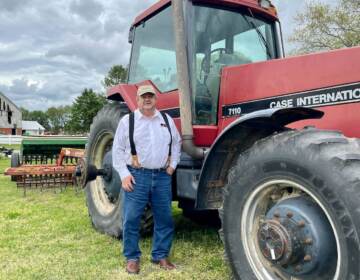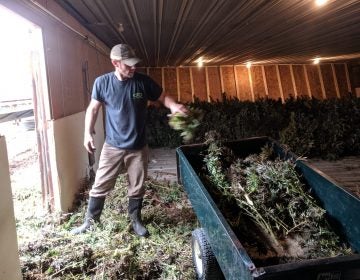New Jersey doesn’t have enough farmers. A lawmaker wants to change that
Proposed legislation in N.J. would create a program to help beginner farmers pay for equipment and buy land to grow their crops.
Listen 1:05
A worker stacks vegetables after they were washed, Tuesday, July 8, 2014, at Marolda Farm in Vineland, N.J. (AP Photo/Matt Rourke)
From Camden and Cherry Hill to Trenton and the Jersey Shore, what about life in New Jersey do you want WHYY News to cover? Let us know.
A proposal is moving forward in the legislature to secure the future of agriculture in the Garden State.
South Jersey Assemblyman William Spearman is sponsoring a measure to create a loan program for beginner farmers. The bill has been unanimously approved by the General Assembly and is now being considered by the Senate Economic Growth Committee.
Spearman said agriculture is a profession filled with uncertainties, and getting started as a farmer can be costly.
“Many farmers have to actually borrow money in order to plant their crops, and then they have to wait and see what they get back when they sell their crops,” Spearman said. There are about 9,000 farmers in New Jersey, according to Spearman, and that number has been declining for several years. The average annual income of a farmer in New Jersey is less than $50,000, and the average age is 60.
“We want to bring in younger farmers and reduce costs for farmers,” he said. “That’s one of the reasons why we have this loan program and increase the certainty of their income.”
Ashley Kerr, the state legislative director and research associate for the New Jersey Farm Bureau, said legislation to support the farming industry is extremely important.
“It’s about local food security,” she said. “We are being out-competed already, with things coming in from overseas where labor costs are cheaper.”
She said farming in the Garden State, especially for new farmers, is expensive due to high fuel and labor costs and rising property taxes. “New Jersey farms’ average production costs per acre are the third highest in the nation and more than four times the national average,” Kerr said.
The new bill requires the New Jersey Economic Development Authority and the Department of Agriculture to develop and administer a loan program to help new farmers buy agricultural land, make agricultural improvements, and get compensated for depreciable agricultural property.
To qualify for a loan under the beginning farmer loan program, an applicant would need to:
- Establish that the applicant is a beginning farmer, as defined in the bill, and is a material and substantial participant in farming activities
- Be a state resident
- Propose to use the loan money to buy agricultural land, agricultural improvements, or depreciable agricultural property located in the state
- Have sufficient education, training, or experience to engage in the type of farming for which the loan is sought
- If the loan is for the acquisition of agricultural land, have access to adequate working capital, farm equipment, machinery, or livestock
- If the loan is for the acquisition of depreciable agricultural property, have access to adequate working capital or agricultural land
- Use the agricultural land, agricultural improvements, and depreciable agricultural property purchased with the loan money only for farming activities conducted by, or under the direction of, the beginning farmer
“We need to bring new people into the fold, as well as support the farmers that we have already,” Kerr said.
Spearman is working on additional legislation to help farmers.
“It involves seeing if we can get more of our school feeding program, more of that food provided by farmers inside New Jersey,” he said.
Spearman said New Jersey spent about $1 billion last year feeding school children, and if more of the food came from farmers in the state, it would help to stabilize and increase their income, while ensuring kids get healthy, nutritious produce and dairy products.
“Anything we can do to add certainty to a farmer’s income is a good thing,” he said.
According to the New Jersey Agriculture Department, food and agriculture are the state’s third-largest industry, behind pharmaceuticals and tourism, bringing in billions of dollars in revenue.
In 2022, the most recent data available, the state’s farms generated cash receipts of nearly $1.5 billion. The leading sectors include nursery/greenhouse/sod, followed by fruits and vegetables, field crops, equine, poultry and eggs, and dairy.
Additionally, the State Agriculture Development is developing a Next Generation Farmer Program to help new and beginning farmers address challenges when getting started and establishing new operations.
The program’s overall goal is not to duplicate existing efforts but to collaborate with partners to develop a coordinated, comprehensive system to identify, train, equip, and support the next generation of farmers in New Jersey. This includes people from farm families, newcomers from non-farming backgrounds, veterans, women, urban growers, and others in historically underserved communities.
“No farmers, no food, the more stable our farm economy is, the better it is for the people of New Jersey,” Spearman said.

Get daily updates from WHYY News!
WHYY is your source for fact-based, in-depth journalism and information. As a nonprofit organization, we rely on financial support from readers like you. Please give today.






